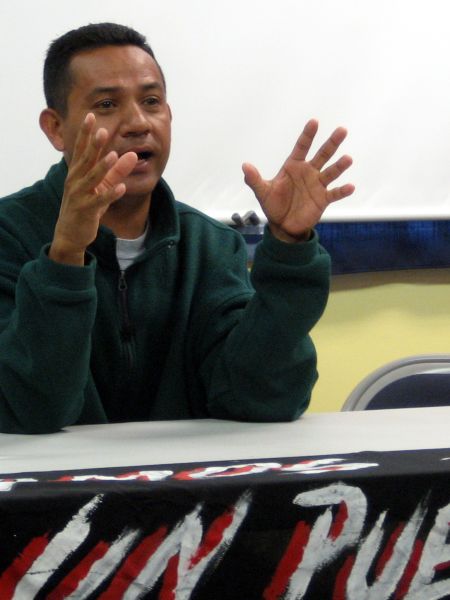TEGUCIGALPA—Were they defending life and protecting their community's water, or were they simply committing a crime? That is the question that 17 Honduran activists charged with obstructing a forestry project faced as their sentencing hearing approached earlier this year. The presiding judges at the trial noted that they would have faced up to several years in jail in Honduras if found guilty.
The forestry project aims to log 1,186 hectares of forest. It is located on part of the 14,100 hectares for which mineral rights concessions were granted to Entre Mares, a subsidiary of Goldcorp, a Vancouver-based mining company.
Goldcorp used 400 hectares of the concession site in the Siria Valley for its San Martin gold mine before it ceased activities in 2008. Since operation of the open-pit mine began in 2000, the communities in the area have attracted international attention as serious health problems have proliferated due to high levels of heavy metals in the water and other mine-related contamination.
The legal case in question dates back to July 5, 2011, when local teacher Carlos Amador and activist Marlon Rovelo Hernandez were arrested by the National Criminal Investigation Unit and charged with obstructing the logging project. Fifteen other local environmental defenders were subsequently accused of the same crime.
After more than a year and a half of waiting, on February 11, 2013, Amador was the first to take the stand at the hearing in Tegucigalpa, the Honduran capital. Lawyers from the Committee of Relatives of the Detained and Disappeared in Honduras (COFADEH) defended the group.
“Everyone here is here to defend life, and the way to do that is to defend the environment and water,” noted Amador as he took the stand. He told the court that the case is really about criminalizing, intimidating and targeting defenders of the environment, and pointed out that three members of the Siria Valley Environmental Committee—the committee at the forefront of fighting back against Goldcorp—were among those charged.
Judge Maria Diaz ruled in favour of the 17 environmental defenders on the first day of the hearing, and all charges were dropped. Among other reasons, Diaz based his decision on the fact that the forestry management project sat on several important sources of water and that the communities' opposition to the project was a legitimate defence of water. It was also demonstrated that several of the defendants were not even present at the site on the day related to the obstruction charges, including Carlos Amador who was in Tegucigalpa at the time.
Amador was pleased with the ruling.
“We were optimistic. We always believed that there would be justice,” he said.
Jose Luis Rubi, mayor of El Porvenir in the Siria Valley, attended the hearing to support those on trial from his community.
“The community is very united in wanting to protect the forest,” Rubi told The Dominion. He added that since the Goldcorp mine opened up in 2000 in the Siria Valley, the community has opposed any efforts to deforest and degrade the water sources of the communities in the valley.
Despite the positive outcome, there is cause for deep concern amongst mining activists in Honduras. On January 23, 2013, the Honduran government passed a new mining law that is very favourable to international mining corporations. The law was written with consultation and support from the Canadian International Development Agency. MiningWatch has called Canada's role in the creation of the new law a conflict of interest and an example of “disaster capitalism.”
Six days after the new law was passed, members of various mining observatory, human rights, legal, and environmental advocacy groups met in Tegucigalpa to discuss the new law and strategize. A broad new coalition was formed, and plans were made to hold nation-wide meetings in the coming months. The coalition's main concerns include the re-opening of the country to open-pit mining, the number of concessions now awaiting approval and those already approved (454 concessions in total), and the priority the new law grants to mining companies over local communities for access to water.
Pedro Landa, a mining specialist working with CEHPRODEC, a community development agency, spoke to the group of 17 men and connected their case to the new mining law.
“You were condemned and singled out in a strategy of weakening opposition and local resistance in an area of high interest to mining companies before the state passed the new mining law,” Landa told an assembled crowd, days before the trial. “The strategy before passing the new law was to send in forestry projects first before the mining companies. These are strategies to penetrate communities. It's like a war.”
(Ed. note: The new mining law was scheduled to come into effect on April 23, but an executive decree effectively suspended its application until the law's regulations are passed. No new concessions are to be granted until that time.)
Rachel Deutsch is a social worker and documentarian who has worked extensively in the area of human rights in Latin America.



